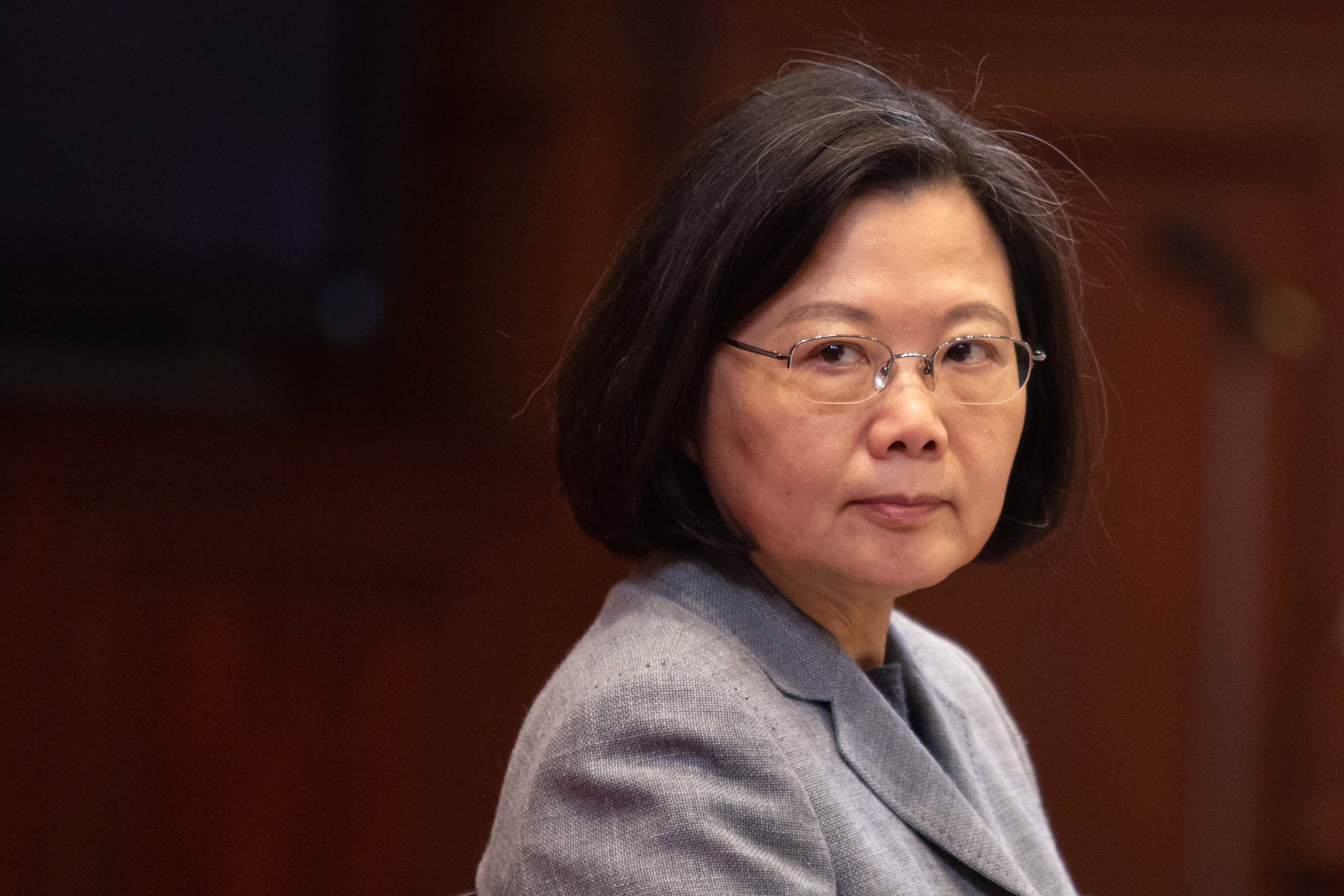
Tsai Ing-wen, Taiwan's president, looks on during a news conference at the Presidential Palace in Taipei, Taiwan, on Saturday, Jan. 5, 2019.
Bloomberg | Bloomberg | Getty Images
Taiwanese President Tsai Ing-wen said late on Sunday that the self-ruled democratic island "stands with the people of Hong Kong" as she pledged "necessary assistance" to Hong Kongers who need help.
Tsai commented on the situation in a Facebook post after China introduced a draft national security law for Hong Kong that would bypass the city's legislature. The measure prompted protests in the financial center over the weekend, reigniting concerns over eroding freedoms in the special administrative territory.
"If the law is implemented, the core values of democracy, freedom and judicial independence in Hong Kong will be severely eroded," said Tsai, who added that the Taiwanese government had already been giving humanitarian relief to Hong Kongers.
Beijing has governed Hong Kong under the "one country, two systems" principle since the former British colony's return to Chinese rule in 1997, but Beijing has been increasing its oversight of Hong Kong. China says Hong Kong retains its autonomy.
Some Hong Kongers have left for Taiwan amid the uncertainty.
Official statistics show the number of Hong Kong immigrants to Taiwan jumped to 2,383 in the first four months of 2020, up 150% from the same period last year, Reuters reported.
Relations between the mainland and Taiwan are now the frostiest in years. China claims the island as a province. Beijing has never renounced the use of force against Taiwan in what it calls a "reunification." The Chinese Communist Party has never governed Taiwan.
Beijing views Tsai, a member of the independence-leaning Democratic Progressive Party, as a separatist.
On Friday, Chinese premier Li Keqiang ostensibly left out the word "peaceful" when he referred to Beijing's perennial desire to "reunify" Taiwan with the mainland — erasing a decades-old practice.
Li said in a speech at the start of China's annual parliamentary meeting that Beijing would "resolutely oppose and deter any separatist activities seeking Taiwan independence."
"We will encourage (our fellow compatriots in Taiwan) to join us in opposing Taiwan independence and promoting China's reunification," Li said, according to an offical transcript. "With these efforts, we can surely create a beautiful future for the rejuvenation of the Chinese nation."
China's relationship with Taiwan has become increasingly strained after Tsai's re-election in January. That was further exacerbated when the island ramped up its bid to join an important World Health Organization meeting last week after its successful coronavirus containment efforts.
The U.S. has also been vocal about its support for Taiwan, incurring the wrath of Beijing, which has said that the island is the most sensitive issue in the Sino-American relationship.
On Sunday, China's top diplomat Wang Yi said the U.S. should not challenge China's red line on Taiwan.
"There's growing concerns in the mainland around the potential for Taiwan to enhance its international standing in part as a result of support from the United States, but also frankly from the outstanding job that Taiwan has done in battling the Covid-19 pandemic," Elizabeth Economy, C.V. Starr senior fellow and director for Asia studies at the Council on Foreign Relations, said Friday.
With the latest developments in Hong Kong, the Taiwanese people are likely to be even more wary about China's pursuit.
Major political parties in Taiwan have rejected the "one country, two systems" model that China has been trying to sell the island. Hong Kong operates under that framework, which is supposed grant the city legal and economic systems that are separate from those of the mainland.
"I don't think anyone in Taiwan, very few people, will believe in the 'one country, two systems' formula. So this means that Taiwan is going to drift much more out of the category of the One China complex," said Orville Schell, Arthur Ross director of the Center on U.S.-China Relations at the Asia Society.
"That's very, very fraught, because then you end up with a cross-strait situation and a potential military conflict should Taiwan drift far enough that China feels it has to take some kind of demonstrative, (or) at least symbolic action to prevent it," Schnell told CNBC on Friday.
https://news.google.com/__i/rss/rd/articles/CBMiZmh0dHBzOi8vd3d3LmNuYmMuY29tLzIwMjAvMDUvMjUvdGFpd2Fucy10c2FpLWJhY2tzLWhvbmcta29uZ2Vycy1hZnRlci1jaGluYS1wcm9wb3Nlcy1zZWN1cml0eS1sYXcuaHRtbNIBamh0dHBzOi8vd3d3LmNuYmMuY29tL2FtcC8yMDIwLzA1LzI1L3RhaXdhbnMtdHNhaS1iYWNrcy1ob25nLWtvbmdlcnMtYWZ0ZXItY2hpbmEtcHJvcG9zZXMtc2VjdXJpdHktbGF3Lmh0bWw?oc=5
2020-05-25 06:31:55Z
Tidak ada komentar:
Posting Komentar